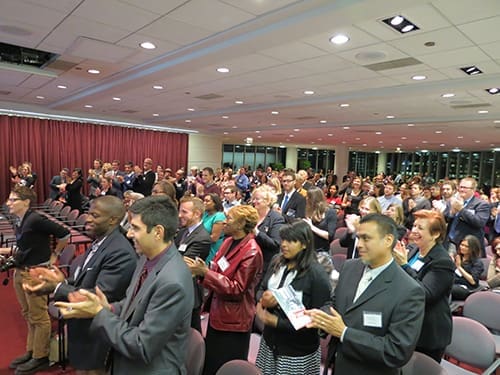By Mike Ziri, (he/him), Director of Public Policy at Equality Illinois
“2020 is the most important election of our lifetime.”
You’ve probably heard that a lot this year, and it’s true. And not just because of the presidential election.
The 2020 election should matter to LGBTQ+ Illinoisans for 3 big reasons that you may not realize: shoring up majorities, representation and redistricting.
Shoring up majorities: We can grow the ranks of state legislators who support LGBTQ+ affirming policies. Remember: in 2019, the Inclusive Curriculum Law passed the Illinois House with only 60 votes – the bare minimum needed for final passage. In 2020, we can add more pro-LGBTQ+ members to the Illinois House and Senate, thereby strengthening the support for legislation that affirms LGBTQ+ people.
Representation: Being at tables of power matters when it comes to passing inclusive policies and changing hearts and minds by sharing our stories. We have the opportunity to ensure the queerest delegation in the history of the Illinois House of Representatives. In fact, 11 LGBTQ+ people are running for state representative — from Effingham County in east central Illinois to McHenry County in northern Illinois. They prove that LGBTQ+ people live, work and pay taxes everywhere across our state.
Redistricting: Following the U.S. Census every ten years, state legislators in Illinois draw the boundaries for each district that has representation in the U.S. House of Representatives and Illinois General Assembly. The maps drawn in 2021 will be in place for the next decade.
In November, LGBTQ+ voters and our allies must send the strongest pro-equality majorities to Springfield. This means electing legislative candidates who share Illinois’ long-standing values of equality, justice and inclusion.
Ensuring that legislative districts unite rather than divide voters from marginalized communities is critical to making state and federal government look like and be responsive to the people they serve, including LGBTQ+ communities. Also, redistricting by pro-equality legislative majorities will impact our policy wins for the next decade.
We could continue to make tremendous progress — or risk losing it all. That’s not hyperbole. Look at Wisconsin: In 2010, a majority of state legislative candidates opposed to equality, choice and the rights of working people were elected and took power in Madison. They were in charge in 2011 when redistricting occurred. Wisconsin’s new maps for state legislative and U.S. House districts were crafted to increase the voting power of Wisconsinites hostile to LGBTQ+ equality, reproductive justice and the rights of working people. Wisconsin has a proud history as the first state to enact statewide non-discrimination protections for lesbian, gay and bisexual people. It’s frustrating and sad that Wisconsin’s progress toward inclusion and equality has stalled because of the established anti-LGBTQ+ majorities protected by the 2011 redistricting process.
Redistricting also impacts federal policy. Illinois state legislators will draw Illinois’ district boundaries for the U.S. House. Pro-equality representation in Washington, D.C. is critical to advancing justice and equality for LGBTQ+ people everywhere in America. We can ensure the strongest pro-equality U.S. House delegation from Illinois for the next decade by voting for the strongest pro-equality Illinois General Assembly in November.
LGBTQ+ equality is on the ballot in 2020. Let’s join together and vote. Learn more at VoteNakedIllinois.org. Together, we must protect and advance equality and justice into the next decade.



